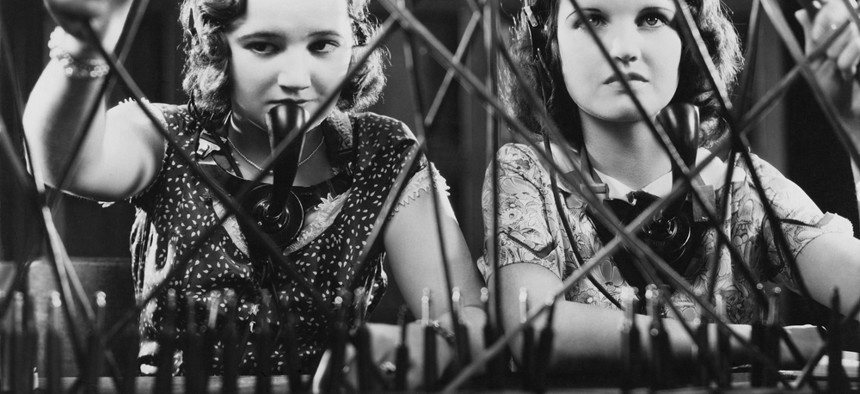How Will the Government Regulate the Phones of the Future?

Telephony of the future will no longer operate via switchboard operators, as it did in its early existence. Everett Collection/Shutterstock.com
The FCC is about to study its regulations.
In a few years, the telephone may be as out of date as the telegraph. Instead, all calls will go over high-speed Internet networks.
But phone companies are subject to a slew of government regulations intended to ensure reliability, promote competition, and expand access. Which of those regulations should apply to the networks of the future and which should be left behind?
That's the question that the Federal Communications Commission is going to try to answer. The agency will vote Thursday to move ahead with a set of trials to study how it should update its regulations to apply in the transition to Internet Protocol, or IP, networks.
The issue may seem arcane, but if grandma tries to call 911 on her new Internet phone and the call doesn't go through, people will notice.
According to an agency spokesman, the FCC will declare four core values for the transition: public safety, universal access, consumer protection, and competition.
"For the last hundred years with the telephone network, we've had a set of rules, a set of operating guidelines, a set of 'this is how I as a consumer can expect to interface with the network,' " FCC Chairman Tom Wheeler said earlier this week at State of the Net, an Internet policy conference in Washington.
"As we go to an all-IP network, the technology has changed, but the basic compact concepts have not."
Many Internet calling services like Skype and Vonage already exist. Broadband Internet networks can carry traffic more efficiently, and the telecommunications giants are tired of maintaining their old networks of copper lines and outdated switches.
The FCC's planned trials will not be technical experiments.
"We do not need trials to figure how to build IP networks. They work. We know how to do that," Wheeler said. "What we do need to do is to understand what happens when that's the network—that's everything we're relying on."
Companies that want to participate in the FCC's experiments will have to apply by Feb. 20. The agency will make decisions about the locations of the trials in May. Once the trials are underway, the FCC will begin collecting data and studying how to adjust its regulations.
Consumer advocacy groups are urging the FCC to ensure that it applies core regulatory safeguards to the networks of the future.
"We cannot, and should not, demand that companies keep the same copper-based technologies forever. But we also should not assume that the new world will automatically be just as good or better. It can easily be a step backward, as well as a step forward," Jodie Griffin and Harold Feld, lawyers for the nonprofit group Public Knowledge, wrote in a white paper last year.
"Deliberate policy choices were responsible for creating the national 911 system or making sure that everyone had affordable phone service. If we make a different set of choices now, we could easily leave these and other things we associate with the phone system behind."
But Republicans see the FCC's proceeding as an opportunity to clear out some of the regulatory underbrush that has accumulated over the last 100 years and is holding back businesses.
Just a few minutes after Wheeler spoke at the Internet conference this week, Sen. John Thune, the top Republican on the Senate Commerce Committee, which oversees the FCC, took the stage to offer his own view of how the agency should treat the phones of the future.
"I honestly do not understand how anyone believes that laws designed for Ma Bell in the 1930s are appropriate for the Internet today," he said. "While there are fundamental goals that need to be preserved—such as universal service and public safety—as policymakers, we need to be open-minded about how to achieve those goals in the future without being bound by the strictures of the past."
He pointed to seemingly needless FCC regulations, such as requiring phone companies to label, track, and report the exact location (down to the shelf) of pieces of equipment.
Thune argued that the accumulated burdens of such rules "represent a significant economic drag that diverts limited resources to lawyers and regulators and away from providing new products and services to consumers."
It could be more than a year before the FCC makes any final decisions about how to regulate the new networks, but the consequences could shape how we communicate for decades to come.
(Image via Everett Collection/Shutterstock.com)






